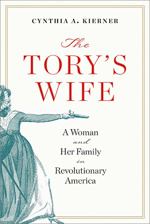Today, we are happy to bring you our conversation with Cynthia A. Kierner, author of The Tory's Wife: A Woman and Her Family in Revolutionary America.
What inspired you to write this book?
I've read lots of women's writing from the revolutionary era. Jane Spurgin—the subject of my book—was one of very few women who were outspoken, publicly, about claiming what she called a citizen's "common rights."
Jane supported the Revolution, though her husband, William, was a Tory who fought for the king. After the war was over, she submitted three increasingly strongly- worded petitions to the state legislature to recover property that her family lost because of William's Toryism. I first found those three documents in North Carolina's state archives in the 1990s and have wanted to figure out the rest of her story ever since.
What did you learn and what are you hoping readers will learn from your book?
Two main things, really.
First, the Revolution was a brutal civil war that could not only pit brother against brother (as the saying goes), but also wife against husband.
Second, that the Spurgins' family story was a particularly extreme example of the perhaps surprisingly common disconnect between prescription and reality. Most people believed that wives' political loyalties—if they had any—would follow their husbands'. Revolutionary-era laws stipulated that Tories would be banished and that (because divorce was legally impossible) people married for life. The Spurgins defied all these truisms and more. An assertive and independent Jane became a property owner. In her own right. William stayed in North Carolina until 1790, and then (while Jane was still alive) began a new family in Canada.
What surprised you the most in the process of writing your book?
The incredible usefulness of early nineteenth-century local histories for uncovering stories of hardship and violence away from the famous battlefields and military encampments, especially in the Carolina backcountry, where the War for Independence was fought out mostly between local people—Whigs and Tories—especially before the 1780s. These early historians drew heavily on interviews with elderly people who had experienced the war, mostly as civilians, and whose testimony makes clear that wartime violence pervaded many communities, despite the absence of formally constituted armies and named battles. These oral histories help us to understand the war as most people at the time would have seen it: less as a series of pivotal military engagements than as a grueling challenge of everyday life.
What’s your favorite anecdote from your book?
My favorite anecdote comes from an early history of the war in North Carolina by Eli Washington Caruthers. Someone told Caruthers that Jane Spurgin had opened her home to General Nathanael Greene, the American commander, and offered her son's services as a scout in 1781. Caruthers's informant also remembered that Jane was "as true a Whig as her husband was a Tory". For my project, it was essential that Caruthers found someone who remembered Jane's commitment to the Revolution and that he included their testimony in his book. Oddly, no one else ever did anything to publicize or commemorate Jane's patriotism. My guess is that many other women took bold political stances only to have their actions erased from history by future generations.
What’s next?
I have two more women's history projects in the works, at opposite ends of the chronological arc of U.S. history. One is a twentieth-century biography tentatively titled "Mother of the Mets: The Life and Times of Joan Whitney Payson." The other is a group biography of the women who staged a fairly famous procession to welcome George Washington when he passed through Trenton, New Jersey, in 1789, en route to assuming the presidency in New York City. Currier and Ives, among others, produced visual representations of the "Ladies of Trenton," and I'm interested in both the women themselves and how they were portrayed and remembered in the nineteenth and twentieth centuries.





